You are using an out of date browser. It may not display this or other websites correctly.
You should upgrade or use an alternative browser.
You should upgrade or use an alternative browser.
αστροβόλητος ή αστρόβλητος
- Thread starter MAKIS
- Start date
...
ἀστρόβλητος, ον = ἀστροβλής, «εἰ τοῦ θέρους ἰσχυρὰ συμβαίνει καύματα καὶ μὴ δύναται τὸ σπώμενον ἐκ τῆς γῆς ὑγρὸν καταψύχειν, φθείρεται μαρανόμενον, καὶ λέγεται σφακελίζειν καὶ ἀστρόβλητα γίνεσθαι τὰ δέντρα» Ἀριστ. π. νεότητος 6, 3, Θεοφρ. Ἱστ. Φ. 4.14, 7, καθ’ Ἡσύχ. «ἀστροβλήτους· τοὺς ὑπὸ τοῦ κυνὸς βαλλομένους».
ἀστρό-βλητος, ον: ἀστροβλής, sun-scorched, Id.Juv.470a32, Thphr.HP4.14.7.
ἀστρόβλητος, ἀστροβλής: starstruck.
(A Greek and English Dictionary, Comprising All the Words in the Writings of the Most Popular Greek Authors:
With the Difficult Inflections in Them and in the Septuagint and New Testament, Rev. John Groves, Hilliard, Gray and Company, 1839)
The most commonly used proper name of this star comes from the Latin Sīrius, from the Ancient Greek Σείριος (Seirios, "glowing" or "scorcher"), although the Greek word itself may have been imported from elsewhere before the Archaic period, one authority suggesting a link with the Egyptian god Osiris. The name's earliest recorded use dates from the 7th century BC in Hesiod's poetic work Works and Days.
...
It was classically depicted as Orion's dog. The Ancient Greeks thought that Sirius's emanations could affect dogs adversely, making them behave abnormally during the "dog days," the hottest days of the summer. The Romans knew these days as dies caniculares, and the star Sirius was called Canicula, "little dog." The excessive panting of dogs in hot weather was thought to place them at risk of desiccation and disease. In extreme cases, a foaming dog might have rabies, which could infect and kill humans whom they had bitten. Homer, in the Iliad, describes the approach of Achilles toward Troy in these words:
Sirius rises late in the dark, liquid sky
On summer nights, star of stars,
Orion's Dog they call it, brightest
Of all, but an evil portent, bringing heat
And fevers to suffering humanity.
(Homer (1997). Iliad. Trans. Stanley Lombardo)
http://en.wikipedia.org/wiki/Sirius#Etymology_and_cultural_significance
κυνικά και άλλα καύματα
ehembur sıcakları, ορθ. eyyam-ı bâhûr sıcakları = η πρώτη βδομάδα του Αυγούστου, κυνικά καύματα
Και από έναν κατά καιρούς και κατά κύματα αστρόβλητο, τον Άλαν Πάρσονς, Sirius:
ἀστρόβλητος, ον = ἀστροβλής, «εἰ τοῦ θέρους ἰσχυρὰ συμβαίνει καύματα καὶ μὴ δύναται τὸ σπώμενον ἐκ τῆς γῆς ὑγρὸν καταψύχειν, φθείρεται μαρανόμενον, καὶ λέγεται σφακελίζειν καὶ ἀστρόβλητα γίνεσθαι τὰ δέντρα» Ἀριστ. π. νεότητος 6, 3, Θεοφρ. Ἱστ. Φ. 4.14, 7, καθ’ Ἡσύχ. «ἀστροβλήτους· τοὺς ὑπὸ τοῦ κυνὸς βαλλομένους».
ἀστρό-βλητος, ον: ἀστροβλής, sun-scorched, Id.Juv.470a32, Thphr.HP4.14.7.
ἀστρόβλητος, ἀστροβλής: starstruck.
(A Greek and English Dictionary, Comprising All the Words in the Writings of the Most Popular Greek Authors:
With the Difficult Inflections in Them and in the Septuagint and New Testament, Rev. John Groves, Hilliard, Gray and Company, 1839)
The most commonly used proper name of this star comes from the Latin Sīrius, from the Ancient Greek Σείριος (Seirios, "glowing" or "scorcher"), although the Greek word itself may have been imported from elsewhere before the Archaic period, one authority suggesting a link with the Egyptian god Osiris. The name's earliest recorded use dates from the 7th century BC in Hesiod's poetic work Works and Days.
...
It was classically depicted as Orion's dog. The Ancient Greeks thought that Sirius's emanations could affect dogs adversely, making them behave abnormally during the "dog days," the hottest days of the summer. The Romans knew these days as dies caniculares, and the star Sirius was called Canicula, "little dog." The excessive panting of dogs in hot weather was thought to place them at risk of desiccation and disease. In extreme cases, a foaming dog might have rabies, which could infect and kill humans whom they had bitten. Homer, in the Iliad, describes the approach of Achilles toward Troy in these words:
Sirius rises late in the dark, liquid sky
On summer nights, star of stars,
Orion's Dog they call it, brightest
Of all, but an evil portent, bringing heat
And fevers to suffering humanity.
(Homer (1997). Iliad. Trans. Stanley Lombardo)
http://en.wikipedia.org/wiki/Sirius#Etymology_and_cultural_significance
κυνικά και άλλα καύματα
ehembur sıcakları, ορθ. eyyam-ı bâhûr sıcakları = η πρώτη βδομάδα του Αυγούστου, κυνικά καύματα
Και από έναν κατά καιρούς και κατά κύματα αστρόβλητο, τον Άλαν Πάρσονς, Sirius:
...
Δες και στο βιβλίο Sirius: Brightest Diamond in the Night Sky του J. B. Holberg που έχει ενδιαφέρον γι' αυτό που το θέλεις στο δεύτερο κεφάλαιο, The Dog Star.
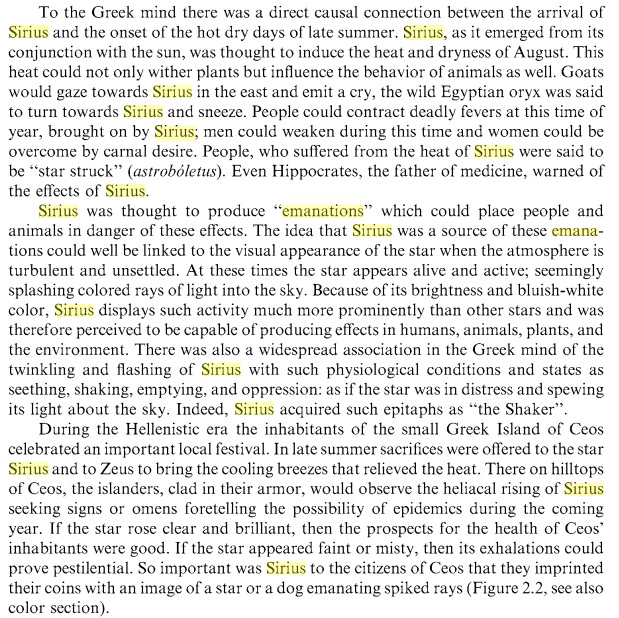
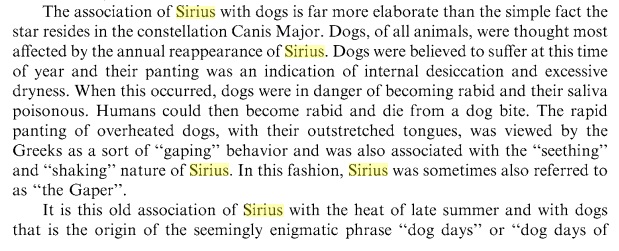
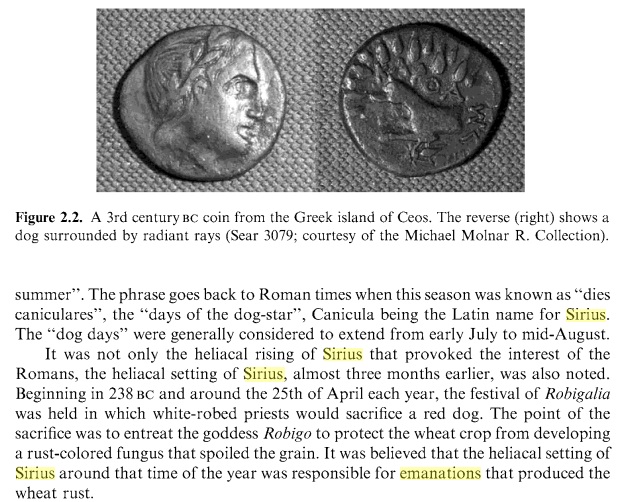
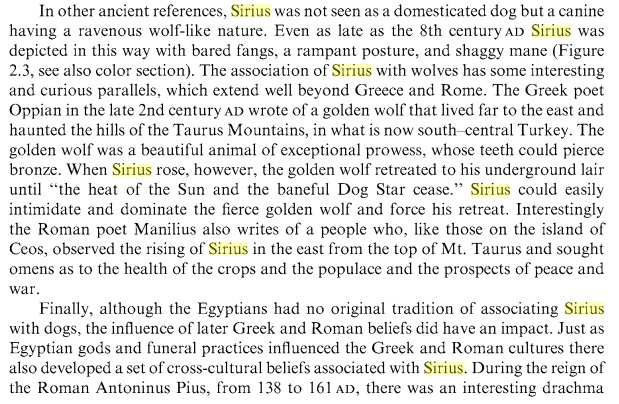
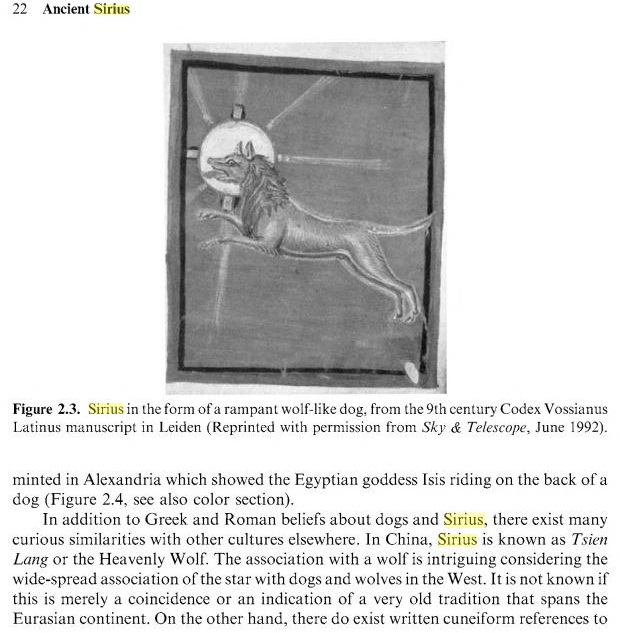
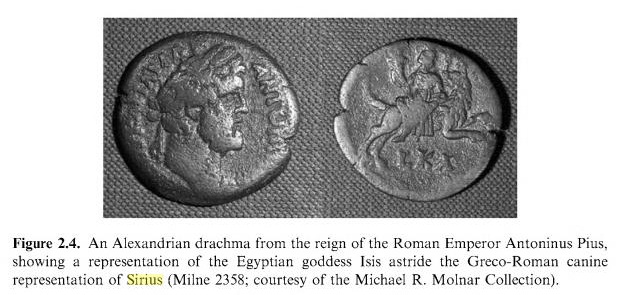
sic: «Indeed, Sirius acquired such epitaphs as "the Shaker".» "Epithets," methinks.
Confusion will be our epitaph...
Δες και στο βιβλίο Sirius: Brightest Diamond in the Night Sky του J. B. Holberg που έχει ενδιαφέρον γι' αυτό που το θέλεις στο δεύτερο κεφάλαιο, The Dog Star.






sic: «Indeed, Sirius acquired such epitaphs as "the Shaker".» "Epithets," methinks.
Confusion will be our epitaph...
